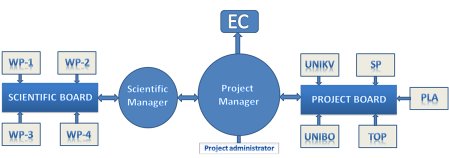Management structure is determined by the rules of MSCA Work Programme, Grant Agreement, composition of the consortium, work breakdown structure and expertise needed for achievement of envisaged goals. Due to the complex nature of the project activities (that include research, training, communication, dissemination and management activities), number of partners and extensive network of interactions between them, the management structure is multi-level and diverse, which enables distribution of management functions, and, ultimately, a more efficient management. The management structure, presented in the next figure, consists of Project Manager, Project Board, Scientific Board, and Scientific Manager.

The Project Manager, according to the H2020 General MGA, coordinates and manages the grant and is the central contact point for the European Commission. This defines her responsibility for overall project progress and achievements of the project objectives, as well as for communication of the project progress and costs to European Commission. Therefore, she is authorized to supervise all project activities and makes necessary changes in project plan. Besides, her responsibility is also organization of internal project communication. In this specific case, her direct responsibility will also be gender balance in the project team, reflecting the importance given to that aspect of the project.
Project Manager institution will be Faculty of Mechanical and Civil Engineering in Kraljevo. With experience as partner in EU funded projects like Tempus, ASO, FP6, FP7 and RSEDP projects, and as coordinating institution of FP7 and RSEDP projects, the Faculty has full organizational and administrative capacity for coordinating international projects of this scale. The Project Manager will be Dr Snežana Ćirić Kostić. Born in 1967, she graduated in Mechanical Engineering at Kraljevo in 1990, defended her M.Sc. thesis in mechanical structures in 1994 from University of Belgrade, and got her PhD in mechanical design from University of Kragujevac in 2010. Author of more than 50 scientific papers, she was participant in six national projects, and she has wide international experience in international projects, participating in Tempus (2006−2008), FP7 (2008−2011) and RSEDP (2011−2013) projects. Particularly relevant for this project, she has experience with secondment mechanism, as she spent 6 months as seconded researcher at UniBo department of University of Bologna. Her management experience in international projects is substantial, as she was representative of the Faculty in a Tempus project board, workpackage leader in a FP7 project, and, finally, she was the Project Manager of the EU funded project “Innovative management for new products−IMPuls”. The project “IMPuls”, with participation of five parties from Serbia and Italy, and with budget over 1 million EUR, represented ultimate challenge and learning experience that prepared her for the role of the Project Manager of this project proposal.
Project Manager will be assisted in her work by Project Board and Scientific Board.
Project Board is the management structure that represents participating institutions. It consists of one representative of each of project partners, appointed by the decision of the responsible manager of the partner. Project Board determines its rules of work and decision making procedures, but the Project Manager is present at the meetings of Project Board. The Project Board deals with a defined part of human resources, management financial management, risk management, promotion activities, networking events and reporting. Project Board will also replace Project Manager in its absence or in the case of her inability to manage the project. Such an improbable case would be determined by a written decision of the manager of coordinating institution who is responsible for international projects. Members of the Project Board are:
- Prof. Dr Zlatan Šoškić from UniKv
- Prof. Dr Giorgio Olmi from UniBo
- Mr. Gian Luca Monti, Director of SP
- Mr. Tomislav Hercigonja, Director of TOP
- Mr. Samir Ćurić, Director of PLA
Scientific Board is the management structure that deals with research and innovation aspects of the project activities. Its responsibilities are a defined part of human resources management, quality management and dissemination activities (digital public repository, workshops, and publications in scientific journals and conferences). The Scientific Board is in charge for coordination and monitoring of the knowledge exchange process (secondments), as well as for the appointment of supervisors. The members of the Scientific Board are the leaders of four work packages that deal with research and training activities and the Scientific Manager, who is manager of the work package that deals with dissemination, which reflects the importance given to that aspect of the project. The responsibility of the Scientific Manager is organization of the activities of the Scientific Board and the communication of the progress of the research and training activities to the Project Manager. The Scientific Manager is independent in his work, but his decisions may be superseded by the decisions of the Project Manager. The Project Manager also replaces the Scientific Manager in the case of his inability to perform his duties. The Scientific Manager will be prof. Giangiacomo Minak from UniBo, who is well-established researcher in the field of experimental mechanics, and the members of the Scientific Board are:
- Ing. Nusret Muharemović from PLA, for WP1-DEFINE
- Dr Nebojša Bogojević from UniKv, for WP2-PRODUCE
- Dr. Nenad Drvar from TOP, for WP3-TEST
- Prof. Dr Dario Croccolo from , for WP4-ANALYZE
The workpackage leaders of the non-research working packages are:
- Prof. Dr Zlatan Šoškić from UniKv for WP5-DISSEMINATION
- Ms. Simona Montanari from SP, for WP6-COMMUNICATION
- Prof. Dr Snežana Ćirić Kostić, for WP7-MANAGEMENT
- MSc. Jelena Tomić from UniKv, for WP8-ETHICS
